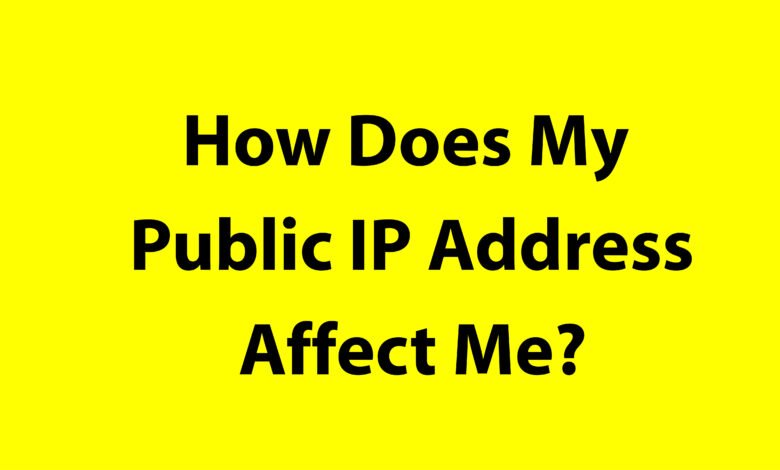How Does My Public IP Address Affect Me?

An Internet Protocol (IP) address is a unique identifier assigned to each device connected to a network, enabling it to communicate with other devices. IP addresses are critical for the functioning of the internet, as they ensure data is sent and received accurately between devices. There are two main types of IP addresses: public and private.
A public IP address is an address that is accessible over the internet, assigned by an Internet Service Provider (ISP). This type of IP address allows your device to communicate with other devices across the globe. For example, when you visit a website, your public IP address is used to establish a connection between your device and the server hosting the website. Public IP addresses are unique across the entire internet, ensuring that each device can be correctly identified and reached.
In contrast, a private IP address is used within a local network, such as a home or office network. These addresses are not accessible from the internet and are used to allow devices within the same network to communicate with each other. For instance, your computer, smartphone, and printer might all have private IP addresses assigned by your router, enabling them to interact within your home network. Private IP addresses are not unique across the internet, meaning the same private IP address can be used in multiple different local networks without causing conflicts.
IP addresses play a pivotal role in the seamless operation of the internet. They act like postal addresses, ensuring that data packets are delivered to the correct destination. Without IP addresses, devices would be unable to locate or communicate with each other, making internet connectivity impossible. Thus, understanding the distinction between public and private IP addresses is fundamental to grasping how devices connect and interact over the internet.
What is a Public IP Address?
A public IP address is a unique identifier assigned to each device that connects to the internet, allowing it to communicate with other devices globally. Unlike private IP addresses, which are used within a local network and are not routable on the internet, public IP addresses ensure devices can be uniquely identified on a global scale. Internet Service Providers (ISPs) are responsible for assigning public IP addresses to their customers, ensuring that each address is unique to avoid conflicts and enable seamless data transmission across the network.
Public IP addresses come in two versions: IPv4 and IPv6. IPv4, the older version, uses a 32-bit address scheme, allowing for approximately 4.3 billion unique addresses. Because of the growing number of internet-connected devices, the pool of available IPv4 addresses is rapidly depleting. To address this limitation, IPv6 was introduced, which uses a 128-bit address scheme, providing a vastly larger number of unique addresses, essentially eliminating the risk of address exhaustion. IPv6 not only expands the address space but also includes improvements in routing and network autoconfiguration.
Transitioning from IPv4 to IPv6 is crucial for the continued growth and scalability of the internet. While many networks and devices still rely on IPv4, the adoption of IPv6 is steadily increasing. This transition ensures that the expanding number of internet-connected devices, from smartphones to IoT devices, can be adequately supported. The unique nature of public IP addresses, whether IPv4 or IPv6, plays a fundamental role in maintaining the integrity and functionality of the internet, enabling devices to connect and communicate effectively.
How Your Public IP Address is Used
Your public IP address plays a crucial role in your daily internet activities, serving as a unique identifier that allows communication between your device and the vast network of the internet. Every time you browse websites, send emails, stream content, or utilize online services, your public IP address acts as a digital return address, ensuring the data you request is delivered accurately to your device.
When you visit a website, for example, your public IP address is sent along with the request to the web server hosting the site. This server then uses your IP address to send the requested web pages back to your device. The same process occurs when you send an email; your email service provider uses your public IP address to route your email through the internet to its intended recipient.
Streaming content is another common activity that heavily relies on your public IP address. Whether you’re watching a movie on a streaming platform or listening to music online, the service provider uses your IP address to deliver the content directly to your device. This ensures that the data streams smoothly and reaches you without interruption.
Moreover, online services such as banking, shopping, and social media also depend on your public IP address. These services use your IP address to manage sessions, authenticate users, and provide location-based content. For instance, an online retailer might use your IP address to display prices in your local currency, while a social media platform might tailor content to your region.
Overall, your public IP address is integral to the functionality and efficiency of your internet experience. It enables seamless communication and ensures that data is correctly routed from servers to your device, making your online activities possible and efficient.
Privacy Implications of Your Public IP Address
Understanding the privacy implications associated with your public IP address is crucial in today’s digital landscape. Your public IP address acts as an identifier for your device on the internet, allowing websites and services to recognize and interact with you. However, this identifier can also be utilized to track your online activities, providing a detailed view of your internet usage patterns over time.
One of the primary privacy concerns is the ability of third parties to approximate your geographical location based on your public IP address. Although it may not pinpoint your exact address, it can reveal your city, state, or even neighborhood. This level of detail can be sufficient for targeted advertising, and in some cases, more sensitive tracking. For instance, if combined with other data points, your public IP address could potentially be linked to your personal information, such as your name, email address, and browsing history.
The risks of IP address exposure extend beyond mere inconvenience. Cybercriminals can exploit your public IP address to launch attacks on your network, such as Distributed Denial of Service (DDoS) attacks. Furthermore, persistent tracking through your IP address can lead to profiling, where entities build a comprehensive picture of your online behaviors, preferences, and habits. This information is often used for marketing purposes but can also be exploited in more malicious ways.
Maintaining privacy online requires proactive measures to safeguard your public IP address. Utilizing Virtual Private Networks (VPNs) or proxy servers can help mask your real IP address, providing a layer of anonymity. Regularly updating your network security settings and being mindful of the information you share online are also critical steps in preserving your privacy. By understanding the implications of your public IP address and taking appropriate precautions, you can better protect your personal information and enjoy a more secure online experience.
Security Risks Linked to Public IP Addresses
Having a public IP address comes with inherent security risks that can pose significant threats to your network and devices. One of the primary concerns is the potential for hacking. Cybercriminals can scan public IP addresses to identify vulnerable systems, which they can then exploit to gain unauthorized access. Once inside, these malicious actors can steal sensitive data, install malware, or even take control of your devices.
Another major risk associated with public IP addresses is the susceptibility to Distributed Denial of Service (DDoS) attacks. In a DDoS attack, the attacker overwhelms your network or service with a flood of traffic, rendering it unavailable to legitimate users. This can severely disrupt business operations, lead to financial losses, and damage your reputation. Public IP addresses are often targeted because they are exposed to the internet, making it easier for attackers to direct large volumes of traffic towards them.
Unauthorized access is also a critical concern. Public IP addresses can act as entry points for cybercriminals seeking to exploit weak passwords, unpatched software, or misconfigured systems. By gaining access through your public IP address, these attackers can infiltrate your network, potentially compromising multiple devices and systems. This can lead to data breaches, loss of intellectual property, and other detrimental consequences.
Cybercriminals often exploit vulnerabilities associated with public IP addresses by employing various tactics such as phishing, social engineering, and exploiting software vulnerabilities. These methods can be used to trick users into revealing confidential information or to install malicious software that grants the attacker persistent access. Once an attacker has a foothold, they can move laterally within the network, compromising additional systems and escalating their privileges.
In light of these risks, it is crucial to implement robust security measures to protect your public IP address. This includes regularly updating software, employing strong password policies, and utilizing firewalls and intrusion detection systems. By staying vigilant and proactive, you can mitigate the security risks associated with public IP addresses and safeguard your network from potential threats.
How to Protect Your Public IP Address
Protecting your public IP address is crucial to safeguard your privacy and security. One of the primary measures you can take is to use a firewall. Firewalls act as a barrier between your network and potential threats, filtering incoming and outgoing traffic based on predetermined security rules. This prevents unauthorized access to your network and helps in protecting your public IP address from misuse.
Another effective method is utilizing a Virtual Private Network (VPN). A VPN masks your public IP address by routing your internet traffic through a secure server, effectively hiding your real IP address from prying eyes. This not only enhances your privacy but also provides an additional layer of security when accessing the internet, especially on public Wi-Fi networks.
Keeping your router and network devices updated is equally essential. Manufacturers frequently release firmware updates to patch security vulnerabilities and improve device performance. Regularly updating your router’s firmware ensures that it has the latest security features. Additionally, changing default passwords and using strong, unique passwords for your network devices can prevent unauthorized access.
Enabling encryption on your Wi-Fi network is another critical step. WPA3 is the latest standard for wireless security, offering more robust encryption compared to its predecessors. Ensure your router is configured to use WPA3, or at least WPA2, to protect your communication from being intercepted by malicious entities.
Lastly, monitoring your network traffic can help you detect any unusual activity. Tools like Intrusion Detection Systems (IDS) can alert you to potential threats, allowing you to take swift action to mitigate risks. Regularly reviewing logs and network activity reports can provide insights into any unauthorized attempts to access your network.
By implementing these security measures, you can significantly reduce the risk of your public IP address being exposed or misused, thereby enhancing your overall online security.
Using a VPN to Mask Your Public IP Address
A Virtual Private Network (VPN) is a technology that allows users to create a secure connection to another network over the internet. By routing your internet traffic through an encrypted tunnel to a server operated by the VPN provider, your public IP address is masked, and the server’s IP address is displayed instead. This process ensures that your actual IP address remains hidden, thereby enhancing your online privacy and security.
One of the key benefits of using a VPN is the enhanced privacy it offers. When connected to a VPN, your online activities become difficult to trace back to your public IP address, protecting you from potential tracking by ISPs, advertisers, or cybercriminals. Additionally, VPNs encrypt your data, making it significantly harder for third parties to intercept and read your communications, a critical advantage when using public Wi-Fi networks.
Choosing a reliable VPN service is crucial to maximizing these benefits. When selecting a VPN provider, consider factors such as the provider’s privacy policy, the strength of encryption protocols, server locations, connection speeds, and customer support. It’s also important to verify that the VPN service does not keep logs of your online activities, ensuring that your browsing history remains confidential.
However, it is essential to be aware of the potential limitations of using a VPN. While VPNs can significantly enhance privacy and security, they can also reduce connection speeds due to the encryption process and the distance between the user and the VPN server. Additionally, not all VPNs are created equal; free VPN services may come with limitations, such as data caps, slower speeds, and questionable privacy practices.
In summary, utilizing a VPN to mask your public IP address offers substantial benefits in terms of privacy and security. By carefully selecting a trustworthy VPN provider and being mindful of its limitations, you can effectively safeguard your online presence and enjoy a more secure internet experience.
Conclusion: Balancing Utility and Privacy
Understanding the implications of your public IP address is crucial in today’s interconnected world. Throughout this blog post, we have explored how a public IP address is assigned to your device and its role in facilitating internet connectivity. We have delved into the potential privacy and security risks associated with exposing your public IP address, highlighting how it can be used to track your online activities, pinpoint your geographic location, and even target you for cyberattacks.
It’s essential to recognize that while your public IP address is a fundamental aspect of your online presence, it also comes with inherent risks. Balancing the utility of internet access with privacy concerns requires a proactive approach. Implementing measures such as using virtual private networks (VPNs), regularly updating your security software, and being mindful of the information you share online can mitigate potential vulnerabilities.
Moreover, being aware of how your public IP address can be exploited underscores the importance of digital literacy and cyber hygiene. By taking conscious steps to safeguard your online identity, you can enjoy the benefits of seamless internet connectivity without compromising your privacy. As technology continues to evolve, staying informed and vigilant will remain paramount in navigating the digital landscape.
In conclusion, your public IP address plays a pivotal role in your internet experience, but it also necessitates a careful balance between utility and privacy. By understanding its impact and actively protecting your digital footprint, you can ensure a safer and more secure online environment.




